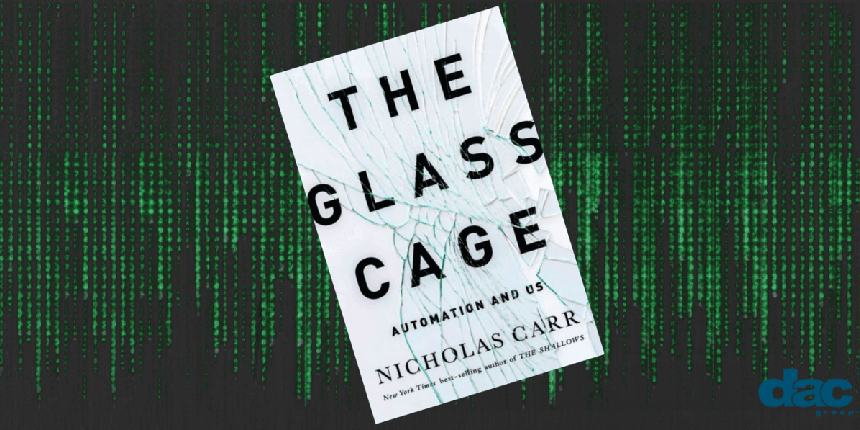Like many of you, I jumped ship from a career in another industry into the “cutting-edge” world of digital marketing. Migrating to an industry in high demand and experiencing unprecedented growth seemed like a very smart and sensible choice. But, following a year of working with various software applications, I grew suspicious of automation’s role in my career. Now, after an introduction to a very compelling argument by Nicholas Carr in his latest book, The Glass Cage, I’m finding that the outlook for “cutting-edge” digital marketing jobs isn’t exactly what I once thought it was.
Automation Makes Sense
Digital marketing has experienced monumental growth in recent years, sparking an explosion of new businesses, jobs, tools, and skills – all designed to help organizations zero in on target segments with a new standard of measurable efficiency and precision. The initial growth spurt was met with some growing pains, requiring expertise to bridge the gap between new users and the new platform. This exposed a great opportunity for agencies and marketers alike – which was quickly exploited.
With software as the backbone, the tools and platforms in this industry iterated and evolved at a frenetic pace – having quickly transformed from a primordial soup of simple tools (by today’s standards) into a suite of sophisticated, nimble, data-driven, self-serve platforms. Today, Google AdWords hosts millions of advertisers, and arguably several hundred thousand expert users who use the platform on a daily basis, driving a predicted spend of $103B online in 2019, more than broadcast and cable television combined.
Woven into the DNA of these platforms, however, is the unstoppable force of automation. The more, the faster, and the better search ads can be created and delivered with all of the right extensions and features, the more revenue the industry stands to generate. With gargantuan crowds being steered by a technology giant like Google, to the tune of billions of dollars annually, the automation of these processes is a most obvious and sensible strategy. As a consequence, online advertising has become more of a commodity than we think.
According to Nicholas Carr, the “analytic information worker” is certainly subject to the effects of automation. And being at the mercy of one of the most innovative and agile companies the world has ever known, the SEM specialist is particularly vulnerable.
Software automation has a few very simple goals: embed more and more skill into the software, limit human dependence, and gain efficiencies. These goals run counter to those of the digital marketer; he or she wants to gain skill, to grow as a professional, and to offer unique value as his or her career progresses.
This raises very significant questions. What is the search engine marketer to do in the face of automation? How can we protect our value and build a marketable set of skills while Google, and other third party software, rapidly iterate toward complete automation? How will we fend off extinction? First, here’s what not to do.
Don’t Become a Platform Expert
We all know that when Google announces an update, we have to learn what it’s about (hopefully accompanied by a free lunch at their office with some cool swag to bring home), tell our team about it, and implement it in our accounts. We don’t decide what to do next, Google does. Like a remora fish following a great white shark, digital marketers swim where the shark swims in order to eat. Tweet “Like a remora fish following a great white shark, digital marketers swim where the shark swims in order to eat.”] Google makes a change, and millions of accounts need to change, whether we like it or not.
We evolve our skills to accommodate the changes made to the search engine. We are what Harvard professor James Bright terms “machine operators” – workers who operate machines designed to make the workflow more efficient. The machine is adjusted and managed by controls, such as levers and buttons, and is monitored by its operator. This contrasts with a “machinist,” who uses the machine to suit his or her purposes according to his or her skill level (think of a trained carpenter using a circular saw).
Machine operators apply themselves to a process as defined by the machine’s architects. And so, the machine’s design dictates what skills the machine operator contributes to the work. The machine operator, according to Bright’s landmark research across multiple industries, suffers from a “de-skilling” as machines become more capable. Carr cites additional research, particularly studies conducted in the airline industry (which is a mature example of automation), that demonstrates both a convergence and drop in the skill level of all pilots. As the machines progress, they assume more and more of the workload, leaving operators with less and less responsibility, and consequently, less skill.
Google Adwords is a very elaborate machine. The Adwords platform hosts millions of machine operators, pulling levers and pressing buttons day in and day out. As the platform continuously streamlines its processes, creating increasingly frictionless software, the SEM specialist will fly the way of the pilot. With every update to make keyword uploads simpler, to make tagging smoother, to make keyword bid suggestions smarter, and changes of the sort, the demands of the specialist will lessen and the province of SEM expertise will shrink. We will be inevitably relegated to monitoring accounts and maybe to intervening in the event of errors or problems – something Carr shows results in a disengaged workforce due to limited active participation. Platform expertise will lead you down a road of basic, common, easy-to-acquire skills, and leave you occupying a less and less interesting job.
Make Way For Automated Bidding Platforms
I recently had the privilege of using a third party automated bid management platform this year. Anticipating an incredible learning opportunity, I dove into hours of webinars describing the mechanics of the system. The theory of the tool was very interesting – predictive modeling that integrates user behavior, aggressive bid strategies to test predictions, and more. But learning the theory was akin to learning the aerodynamics that are particular to a specific modern aircraft: very interesting, but not easily applied to piloting said aircraft, rendering it a rather non-marketable skill. My actual learning came in the form of interface navigation, report creation, and basic parameter changes – the algorithm did most of the heavy lifting, whether I knew how it worked or not. This, of course, is somewhat of an over-simplification, but it serves as a great example of things to come.
Additionally, though many SEM specialists hold mistrust of such automated tools, my experience showed that the software can deliver impressive results. Regardless, these tools (like all software) are only going to get more powerful, more sophisticated, more effective, and easier to use as time goes on. If software is successfully trading billions of dollars in the financial markets today, displacing tens of thousands of traders out of their jobs, eventually these processes will be adapted to keyword auctions in Google. It’s not going to be easy for a human to keep up with the rushing stream of data underpinning the automated decision processes that these platforms will soon perform.
Don’t Become a Plain Old Analyst
It’s a common sense theory that with the rise of automation, the analyst is liberated from technical and manual tasks, and is now free to perform deeper analyses and more nuanced work. Upon examining that logical connection, the details of that corollary appear a little fuzzy. Carr demonstrates that the anticipated liberation from more routine tasks simply doesn’t materialize, across a number of fields.
With additional layers of automation, the speed at which information is processed far outstrips what the human mind can keep track of (I already noticed this with the automated bidding platform). It becomes increasingly difficult to implement changes proposed by limited “human analytics” when the system is mechanically and informationally complex. The layers that automation erects between the operator and task create a distance, where the operator has no real feel for what lies beneath the code. The specialist will slowly have a weakening understanding of the workings of the process, and passivity results. The tool becomes more opaque until it is eventually a black box.
Carr illustrates that automation creates a skill “degeneration effect,” where the mind performs more poorly the less cognitive lifting it does. The less we participate, the more our skills atrophy and so too our capacities for higher functions. This effect has been observed after automation has been introduced in multiple industries, including the medical profession, the airline industry, finance, and more.
Of course, not all automation results in the degeneration effect. For example, the automation of purely repetitive tasks, or information organization and retrieval, free up the human for more subtle and complex work. Features aiding in bulk uploads, or QA for URLs, are great time savers and reduce human error, allowing us to spend our time on deeper issues. But we are moving far beyond this degree of automation. With Google at the helm, machine learning and big data will continue to charge forward and further encroach on “SEM expertise”.
So what’s left for someone working with search engines? To find the answer, one must accept automation as a given, and build one’s career around that assumption, looking for opportunities borne out of the software revolution.
Anticipate Strategic Differentiation
Both software providers and agencies alike will have to pursue sustainable competitive advantages if they expect to last in the automated age.
It’s a safe assumption that Google will continue to grow, and will maintain a free-to-use platform that is common to all clients (Mom & Pop shops and Fortune 500 retailers both use the same system). Third party software businesses will likely step in to offer a layer of automated customization to particular business types and particular verticals looking to gain an advantage of their competition.
The digital agency value proposition will have to adapt to fit into this picture. Some agencies may design their own proprietary software, effectively becoming software companies. Others will broker software licenses to clients, and consult with these vendors on behalf of clients.
In all cases, the SEM specialist will have to insert himself or herself into a role that informs decisions made around these tools. And in order to contribute value, the specialist of the future will have to know something that machines don’t easily know – which implies extending themselves beyond the boundaries of the platform’s purview.
Become a Vertical Expert
Agencies can attune themselves to particular verticals where they plan to do business, which is to say that they can become vertical experts. Specialists can add value by continuously ingesting information about these verticals, the major players, new technology, regulation, and more. Though it can be a challenge to tell clients about their business, since clients live and breathe it, focusing on digital marketing can keep this conversation valuable and productive.
Once the agency has a base of several clients under its belt, aggregating existing client data to produce growth trends, seasonality indices, benchmarks, and insight into the customer journey, can be an extremely valuable service. The specialist must incorporate multiple data sources in order to protect their offering from what automated software can provide.
The ability to assess and quantify the possible impact of, say, an upcoming election on the forecasts and targets generated by software would be a value enhancer. The specialist should be able to integrate nuanced information into his or her reports and detail how the marketing campaign should adjust in light of this information. A “state of the vertical report” with respect to digital marketing could be a service provided by the SEM specialist.
Build and Evaluate Business Cases
One particular automated platform doesn’t know how another platform works – it’s outside of its field of view. Comparing one software vendor to the next will be a significant function for the future specialist. This assessment will be much more subtle than comparing features and prices.
Running scenarios, forecasting ROI, assessing all direct and indirect costs associated with deploying and maintaining these tools, with rigor, will be needed to distinguish which software offering would be best for a particular client. This is all to say, that creating business cases that include factors that go beyond the tool’s data points will be essential in client acquisition and retention.
Finally, Learn How to Sell
Software will evolve to take on the tasks of report generation, pattern finding, forecasting, scenario testing and more, and the specialist will be left with less “to do.” Relying on licensed software to manage accounts and perform these tasks will result in a lower margin on client business. More clients, to maintain portfolio volume, and more business to fill the pipeline means – more sales!
Consolidating, organizing, and summarizing information about digital marketing software and particular verticals will be table stakes for any sales pitch. Additionally, working knowledge of how software works will be much more valuable in a sales meeting versus actually managing accounts. SEM specialists can offer informed opinions on software solutions for prospective clients in target verticals, and by inserting themselves into the sales process they can really add value.
For the foreseeable future, it will be people making decisions to purchase one solution over the next. Though not for everyone, sales will be a territory of digital marketing that will be essential and will not easily be replaced by automation.
What Do We Do About it? A Call to Action
Just looking back five years is enough evidence to be convinced that technology will radically change our careers. It’s inevitable.
I’ve realized that maintaining the course, continuing to build platform expertise without considering the future of automation in digital marketing, is simply and utterly myopic. It’s not enough to simply adapt to the software changes as they come. To add real value, it’s imperative that we swim out of this current of Google’s constant iterations, and find ground in a set of skills that has a non-reactive relationship with this new technology.
We should not fear technology, as we aren’t luddites – our jobs came into being because of a massive technological shift. We must anticipate the impact automation will have on our careers and actively find ways to build skills that steer this technology, that add layers of value to the technology, that help us decide when and how to use this technology.
I encourage all search engine marketers to open a dialogue in order to cultivate skills that exist independent of what the search engines offer do the same. This conversation requires a lot of heads, to creatively brainstorm sustainable career paths and new business opportunity. A collaborative force of intellect and energy is needed, outside of the walls of Google, to help develop meaningful and sustainable career paths in digital marketing in the face of automation.
Contact DAC today to find out more!





